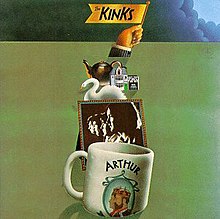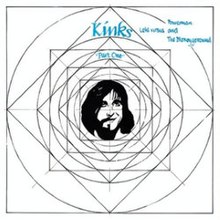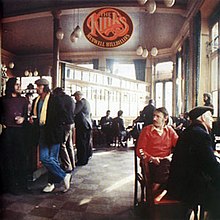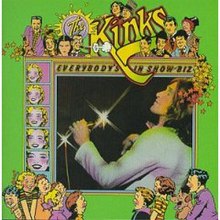The Kinks always seemed like the most British of the British Invasion bands. And there’s a good reason for that. After their first, short, disastrous tour of the US, the Musicians’ Union banned the Kinks from America for the entirety of their sixties heyday. Perhaps the Union was really concerned with all these immigrants coming and stealing American rock’n’roll jobs, or maybe they really did violate some sort of by-law. Certainly, the Beatles were too big to kick out, and bands like the Hollies were too innocuous. Besides there was always something about the Kinks that got under certain people’s skins. The Stones may have been “the most dangerous band” but the Kinks were something even worse… subversive. The name was not an innocent mistake or a calculated attempt to manufacture outrage; there was something kinky about this band. Especially for the time, they were far more comfortable to with playing with gender and sexual orientation than most folks were comfortable with until David Bowie and Elton John came along. So they were banned from the USA.
As a result the Kinks became very insular and inward-focused. They recorded an album that became frequently cited as their high-water mark, The Kinks Are Village Green Preservation Society, an album chock-full of odes an older, quieter, quainter way of life. Make Britain great again (uh-oh!). While the album did their usual fair-to-middling sales, it has gone on to become their most critically lauded album. Personally I prefer Arthur slightly, but I can see why this album was seen as so remarkable at the time. Most post-Sgt Pepper concept album were about pushing boundaries and experimenting with psychedelics, so it was quite a shock to hear a rock band sing about such bucolic topics. Exactly how sincere or ironic the Kinks were on this album depends on which member of the band you asked, but it’s success encouraged main songwriter Ray Davies to go even farther on their next album.
That album would be Arthur (or The Decline and Fall of the British Empire). The album was initially written and recorded to accompany an unproduced teleplay about a family who is forced to repatriate from England to Australia and their trials and tribulations. A new bassist may have influenced the band, who have a larger harder, heavier edge on this record than the last one. Or maybe they were all getting bored with Ray’s concept Album shenanigans.
From here, Ray wrote a whole album about a topic that was really near and dear to his heart: his money. Given that the Kinks various managers and agents had screwed them over in a manner second only to Badfinger, Ray had a lot to say about the subject on Lola vs. Powerman and the MoneyGoRound, vol. 1. Oddly enough it was one of the few songs not about the Kinks’ financial situation that actually gave their career a second wind no one excepted from a song about a cross-dresser. Sure, it may not have aged that well, but for the time it was both progressive and provocative. And coming at the cusp of the whole glam rock scene, the track ended up replenishing the coffers that Ray was so preoccupied with. Not only were the Kinks back on the charts, but the Musicians’ Union finally lifted their ban, allowing the Kinks to (belatedly) conquer America. Although first they had to knock out the soundtrack to a BBC TV movie about the inner dialogue of an anthropomorphic penis (seriously!).
Becoming rich and famous again, immediately made Ray want to retreat to the rural hillside. Their next concept album Muswell Hillbillies is essentially the English equivalent of country music. Lots of acoustic guitars. Lots of songs about having a nervous breakdown from the stress of modern life. And the inevitability that this escape wouldn’t last.
It didn’t last. Soon the Kinks were becoming hardened road warriors. Their next album, Everybody’s In Show-Biz is yet again a concept album. This was a double album with one disc being a live record from their recent tour, and the other disc being a studio album about the rigors and hardships of touring. Keeping with Ray’s skewed priorities and perspective, there are like three or four songs about how bad the food is. Still the live half of the album shows how much fun the Kinks have playing in front of a large audience, and how big and theatrical their new show was. That had even added a horn section on tour. So of course, the Kinks were now going to go back to writing straightforward, arena rock classics, that the whole crowd can sing along with.
Right?




